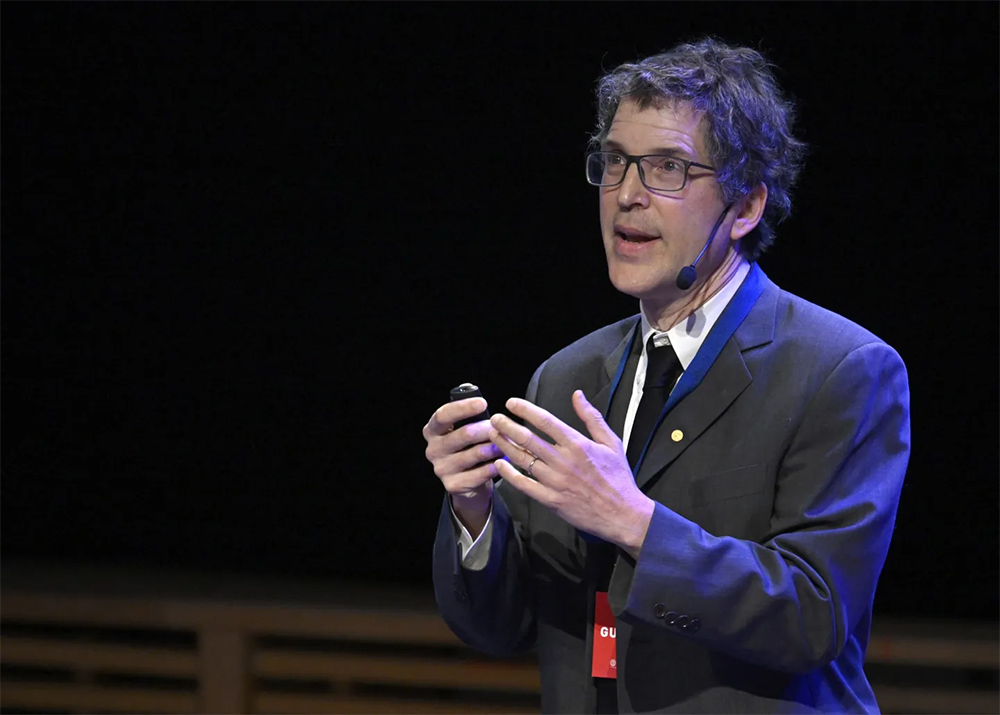
• 人工智能容易出现“幻觉”,或编造它认为是真实存在的甚至看起来合理或可信的信息。然而,当人们批评人工智能出现“幻觉”的可能性时,科学家们却在为这种副作用欢呼。他们表示,这让科学家们更有可能有新的发明和发现。
今年10月,戴维·贝克与其他两位科学家(他也是唯一一位美国人)共同获得诺贝尔化学奖。来自华盛顿大学(University of Washington)的贝克因利用计算机软件发明新蛋白质而获奖。
在获奖名单公布之前,贝克在接受《纽约时报》采访时表示,人工智能幻觉在“从头开始制造蛋白质”的过程中发挥了关键作用,他补充道,这帮助他的实验室设计出大约1,000万种“在自然界中不存在的”、“全新的”蛋白质。
他表示:“科技发展日新月异。即使终生从事蛋白质研究的科学家,也不清楚当前科技发展到了什么程度。”
AI幻觉是指人工智能编造其认为是真实的信息。对于许多人而言,乍一看,这些信息貌似就是事实,因为AI可以生成看起来高度可信的虚假信息。然而,尽管AI幻觉被许多人所诟病,但贝克的例子却证明了它的潜在用途。
联邦AI研究所AI2ES的首席研究员艾米·麦戈文对《纽约时报》表示:“公众认为AI幻觉是坏事。但它实际上能给科学家提供新的创意。”
麻省理工学院(MIT)生物工程教授詹姆斯·科林斯最近也称赞AI幻觉加快了他的新型抗生素研究的进展。他表示:“我们正在探索。我们要求模型提出全新的分子。”
在分子这个话题上,诺贝尔奖评选委员会似乎并不在意贝克在研究中使用AI或AI幻觉。相反,该委员会表示,贝克的团队能够“创造出一个又一个富有想象力的蛋白质设计”。
贝克希望AI能帮助他创造更多“真正有用”的蛋白质,比如能够分解许多人认为与阿尔茨海默病等神经退行性疾病相关的异常蛋白质结构。(财富中文网)
译者:刘进龙
审校:汪皓
• 人工智能容易出现“幻觉”,或编造它认为是真实存在的甚至看起来合理或可信的信息。然而,当人们批评人工智能出现“幻觉”的可能性时,科学家们却在为这种副作用欢呼。他们表示,这让科学家们更有可能有新的发明和发现。
今年10月,戴维·贝克与其他两位科学家(他也是唯一一位美国人)共同获得诺贝尔化学奖。来自华盛顿大学(University of Washington)的贝克因利用计算机软件发明新蛋白质而获奖。
在获奖名单公布之前,贝克在接受《纽约时报》采访时表示,人工智能幻觉在“从头开始制造蛋白质”的过程中发挥了关键作用,他补充道,这帮助他的实验室设计出大约1,000万种“在自然界中不存在的”、“全新的”蛋白质。
他表示:“科技发展日新月异。即使终生从事蛋白质研究的科学家,也不清楚当前科技发展到了什么程度。”
AI幻觉是指人工智能编造其认为是真实的信息。对于许多人而言,乍一看,这些信息貌似就是事实,因为AI可以生成看起来高度可信的虚假信息。然而,尽管AI幻觉被许多人所诟病,但贝克的例子却证明了它的潜在用途。
联邦AI研究所AI2ES的首席研究员艾米·麦戈文对《纽约时报》表示:“公众认为AI幻觉是坏事。但它实际上能给科学家提供新的创意。”
麻省理工学院(MIT)生物工程教授詹姆斯·科林斯最近也称赞AI幻觉加快了他的新型抗生素研究的进展。他表示:“我们正在探索。我们要求模型提出全新的分子。”
在分子这个话题上,诺贝尔奖评选委员会似乎并不在意贝克在研究中使用AI或AI幻觉。相反,该委员会表示,贝克的团队能够“创造出一个又一个富有想象力的蛋白质设计”。
贝克希望AI能帮助他创造更多“真正有用”的蛋白质,比如能够分解许多人认为与阿尔茨海默病等神经退行性疾病相关的异常蛋白质结构。(财富中文网)
译者:刘进龙
审校:汪皓
• AI has the tendency to “hallucinate,” or make up information that it thinks is real—and even seems legitimate, or plausible. But while people criticize AI for its ability to hallucinate, scientists celebrate this side effect. They say it’s helped make new inventions and discoveries possible.
In October, David Baker was one of three scientists—and the only American among them—to win the Nobel Prize in chemistry. Baker, from the University of Washington, won for using computer software to invent a new protein.
In an interview with the New York Times before the prize announcement, Baker said AI hallucinations were central to “making proteins from scratch,” adding they helped his lab to design around 10 million “all brand-new” proteins that “don’t occur in nature.”
“Things are moving fast,” he said. “Even scientists who do proteins for a living don’t know how far things have come.”
AI hallucinations happen when artificial intelligence makes up information that it believes is true. And for many folks, at first glance, that information will likely appear to be factual, as AI can roll out fake information that looks highly plausible. But while this has become a topic of criticism for many people, Baker’s example highlights its potential usefulness.
“The public thinks it’s all bad,” Amy McGovern, principal investigator for the federal AI institute AI2ES, told the NYT. “But it’s actually giving scientists new ideas.”
James Collins, a biological engineering professor at MIT, also recently praised hallucinations for accelerating his research into new types of antibiotics. “We’re exploring,” he said. “We’re asking the models to come up with completely new molecules.”
On the topic of molecules, the Nobel Prize committee didn’t seem fazed by Baker’s use of AI, or its hallucinations, in his research. Instead, it said his team was able to produce “one imaginative protein creation after another.”
Baker hopes AI can help him create more proteins “that actually do things,” like break up the abnormal protein structures many believe to be associated with neurodegenerative diseases like Alzheimer’s.






